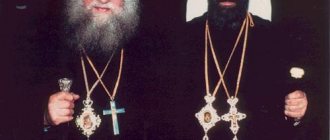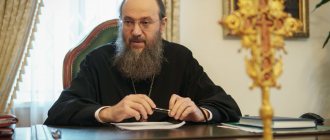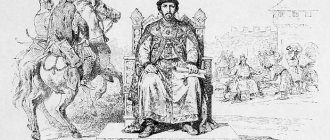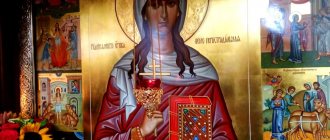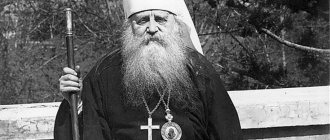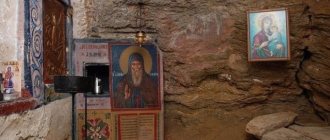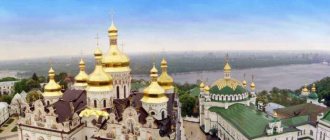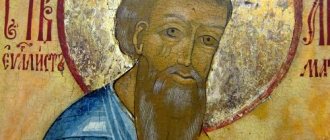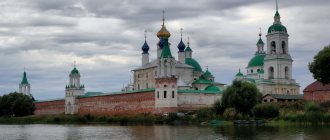The childhood, wanderings, and youth of Metropolitan Anthony of Sourozh
In the world, before entering monasticism: Andrei Borisovich Bloom, born in Switzerland, in Lausanne.
His maternal grandfather belonged to Russian diplomatic circles; served as consul in various places. My grandfather met Metropolitan Anthony’s future grandmother, a native of Trieste (Italy), while he was there on public service duty. He taught her Russian. After they tied the knot, her grandfather brought her to Russia. Their daughter, Ksenia Nikolaevna Skryabina (sister of the famous composer A. Scriabin), mother of Andrei (Antonia), met her future husband, Boris Eduardovich Bloom, during the holidays, when she went to Erzurum, where her father was serving at that time. Boris Eduardovich worked there as a translator. After a serious feeling arose between them, they got married.
After Andrei was born, his family stayed in Lausanne for about two months, and then moved to Russia, to Moscow. Around 1915-16, in connection with B. Bloom's appointment to the East, the family moved to Persia. The future bishop spent his childhood there. For some time he had a Russian nanny, but mainly his grandmother and mother were involved in his upbringing.
Andrei's childhood fell on a turbulent time. Due to the First World War, revolutionary chaos and political changes in Russia, the family had to face the difficulties of a wandering life. In 1920, Andrei’s mother, he himself and his grandmother left their Persian home, while his father was forced to stay. The difficulties associated with endless travel, sometimes on horseback, sometimes in carts, were superimposed by the dangers of encountering robbers.
In 1921, everyone reached the West together. Having traveled many European roads and ending up in France, the family finally found the opportunity to settle down. This happened in 1923. There were many difficulties associated with the peculiarities of emigrant life. All this was aggravated by unemployment. Her mother's employment was facilitated by her knowledge of foreign languages and her skills as a stenographer.
In France, Andrei had to live separately from his family. The school where he was placed was located outside of Paris, in such a disadvantaged area that, starting in the evening twilight, even the local police did not dare to enter, because “they were slaughtering there.”
At school, Andrei, like many others, had to endure bullying and beatings from students. We can say that at that time the educational school served for him as a school of patience, survival, and courage. Many years later, when one day, while reading on the subway, he got distracted and glanced at the sign with the name of the station, and it turned out that it was the station, not far from which his school had once been located, he fainted from the rush of memories.
It should be noted that both the current difficulties and the forced life away from Russia did not deprive Andrei’s loved ones of love for her. Over time, this love was passed on to him.
Emigration
Andrey spent his childhood in Iran, where his father worked as a consul, and in Russia. But after the revolution of 1917, the family had to leave for Europe, sharing the emigrant fate of hundreds of thousands of Russian families thrown out of Russia by the new government.
After several years of wandering, they settled in France in 1923, where he graduated from a workers' school on the outskirts of Paris. "Why? It was the cheapest, firstly, then, the only one at that time around Paris and in Paris itself, where I could live.”
So that children do not lose touch with Russia and do not forget the language and culture of the country, various organizations were created for boys and girls in Paris and other cities of France. So, for example, at the age of 9, Andrei ended up in a scout camp of an organization called “Young Russia”.
There the boys were taught courage, endurance and readiness for exploits and the rules of the Russian language and grammar. After the collapse of Young Russia, there was an organization of “knights”, which then began to form within the Russian Student Christian Movement (RSCM). The differences between the RSHD and the previous organization were the high cultural level and religiosity - during the organization there was a priest and a church in the camp.
Andrey Bloom (right) and father Georgy Shumkin at the Vityaz summer camp at the RSHD. From the archives of the Foundation “Spiritual Heritage of Metropolitan Anthony of Sourozh”
At the age of 14, Andrei Bloom, being an atheist, suddenly involuntarily heard a sermon by a Russian Orthodox priest (Father Sergius Bulgakov), who came to the RSHD summer camp to meet with young people. What the young man heard was disgusting to his own convictions: meekness, humility, obedience - slavish feelings.
To make sure that he was right once and for all, he decided to read the Gospel, choosing the shortest one that was at home. This is how Metropolitan Anthony Bloom himself recalls that moment:
“And so I sat down to read; and here you may take my word for it, because you can’t prove it. ... I was sitting, reading, and between the beginning of the first and the beginning of the third chapter of the Gospel of Mark, which I read slowly because the language was unusual, I suddenly felt that on the other side of the table, here, stood Christ.”
“As soon as I read the Gospel as a 14-year-old boy, I felt that there could be no other task in life than to share with others the life-transforming joy that was revealed to me in the knowledge of God and Christ.”
First steps on the path of Christian, monastic and pastoral life
For a long time, Andrei’s attitude towards the Church, as he later noted, was more than indifferent. One of the immediate reasons for serious hostility was his experience of communication with Catholics. When, due to a lack of means of subsistence, the mother decided to take advantage of their offer of a scholarship for Russian children and brought Andrei to them for a “bride,” he went through an interview and received an affirmative answer, but here he was given a strict condition: he must convert to Catholicism . Considering this condition as an attempt to buy and sell, Andrei was indignant and expressed a strong protest that was not childish. At that time he did not yet understand the essential difference between the Western and Eastern Churches and, as a result, extended his indignation to the “Church in general.”
Andrei's conversion to Christ occurred only at the age of 14. One day he witnessed the sermon of Father Sergius Bulgakov. The sermon shook him up, but he was in no hurry to trust the preacher and upon returning home he asked his mother for the Gospel in order to confirm his mistrust and be convinced that he was right. However, the opposite happened: a careful, thoughtful reading of Scripture changed his attitude towards faith.
Gradually, Andrei became involved in Christian work and fervent prayer. In 1931, having received a pastoral blessing, he began to serve in the church at the Three Hierarchs' Compound (the only church in Paris at that time that belonged to the Moscow Patriarchate). It should be noted that from that time on Andrei did not violate fidelity and did not break canonical communion with the Russian Patriarchal Church.
After graduating from school, he entered the natural sciences and then the medical faculty of the Sorbonne. Student life did not prevent him from making plans to connect his life with monastic feat. He graduated from the Sorbonne in 1939, just before the war, and soon went to the front as a surgeon. But first he took monastic vows, which were accepted by his confessor, although he was not tonsured due to lack of time. He was tonsured as a monk only in 1943. Actually, it was then that he received the name Anthony.
During the occupation, Anthony participated in the French Resistance, then again ended up in the army, healing the wounded and sick. After demobilization, he found his mother and grandmother and brought them to Paris.
It is noteworthy that while carrying out medical activities, Anthony did not forget about the need for living sympathy and compassion for his patients, which, unfortunately, he could not say about some of the doctors he personally knew, hardened by the horrors of war. It is worthy of note that empathy and sensitivity to man, the ability to see in him not just a citizen, but a neighbor, the desire to contemplate in him the image and likeness of the Creator, contributed to Father Anthony throughout his pastoral activity.
In 1948, he was ordained a hierodeacon, and soon after he was ordained a hieromonk, after which he accepted spiritual leadership over the members of the Orthodox Anglican Fellowship of St. Albanius and St. Sergius. As Metropolitan Anthony himself later recalled, this turn in fate was facilitated by a meeting with Archimandrite Leo (Gillet), which took place at the Orthodox Anglican Congress. Then, having talked with Anthony, the archimandrite advised him to leave the profession of a doctor, become a priest and continue serving God in England.
Since 1950, Father Anthony served as rector of the Church of the Holy Apostle Philip and St. Sergius in London. In 1953 he was ordained to the rank of abbot, and in 1956 to the rank of archimandrite. A little later, he accepted the position of rector of the Church of the Assumption of the Mother of God and All Saints in London.
In 1957, Father Anthony was installed as Bishop of Sergievsky. In 1962, he was consecrated to the rank of archbishop for the newly established Sourozh diocese in the British Isles. From 1966, upon his elevation to the rank of metropolitan, and until 1974, Anthony of Sourozh served as Patriarchal Exarch in Western Europe, after which he was released from this position at his own request. Meanwhile, he continued to minister to his flock. It should be noted that during the period of his leadership, a clearly organized structure of parishes was formed in the diocese, with well-established educational work.
By that time, Metropolitan Anthony had earned well-deserved respect among Christians around the world and his ardent preaching was spreading everywhere: through numerous lectures and publications, translated into all kinds of languages; through radio and television.
In 1983, the Council of the Moscow Theological Academy awarded Metropolitan Anthony the degree of Doctor of Theology for a body of pastoral and theological works. In addition, at different times he was awarded the title of honorary doctor of Aberdeen (1973) and Cambridge (1996) universities, and the Kyiv Theological Academy (2000).
In the last months of his life, due to deteriorating health, Vladyka served rarely and appeared in public less often. He died on August 4, 2003. And on August 13, 2003, in the Cathedral of the Assumption of the Mother of God and All Saints in London, his funeral service took place. The funeral service was performed by Metropolitan Philaret of Minsk and Slutsk.
Russia
From an early age, Anthony of Sourozhsky (even after leaving the country in 1917) retained a tender, reverent attitude towards Russia as his Motherland: “I am Russian myself, Russian culture, Russian beliefs, I feel that Russia is my Motherland.”
He never stopped praying for her, her well-being. Even the flock of the Diocese of Sourozh, which the Metropolitan founded in 1962, consisted mainly of those Russian emigrants who did not want to lose their Russian roots, their connection with Russia, where the church was in isolation.
Since 1960, the Metropolitan had the opportunity to come to the Soviet Union, conduct services, read sermons, and speak to students of the Theological Academy. But the most remarkable and memorable were the informal meetings in apartments (the so-called “kvartirniki”), chock-full of people eager to hear the word of God expressed in simple, accessible and understandable language.
Here is what Archpriest Nikolai Vedernikov, one of the organizers of the “apartments”, says about such conversations:
“He was the only person of such talent, sent by God’s providence to our world, to our country... He introduced us all to his highest spiritual experience. This communion was carried out through the simplest words.”
Metropolitan Anthony of Sourozh (left) in the Moscow metro on his first visit to Russia. Oct. 1960. From the archive of the Foundation “Spiritual Heritage of Metropolitan Anthony of Sourozh”
General directions of preaching and scientific and theological works of Metropolitan Anthony of Sourozh
Despite the existence of a large number of works published under the authorship of Metropolitan Anthony, many of these works do not actually represent the fruit of his writing. Most of the published works are reproductions of recordings of oral sermons and conversations delivered under different circumstances, in different audiences (see: Proceedings. Volume I; Proceedings. Volume II).
The Metropolitan did not always devote his speeches to a predetermined topic. Quite often, the subjects of his sermons were issues that interested specific listeners in a specific situation, at a specific moment. And these were the most diverse questions. This is partly what explains the wide range of topics covered by his teachings.
The general characteristics of the Metropolitan’s instructions are marked by several pronounced features. Firstly, a significant part of his works is written in clear and accessible language, and can be perceived directly by a wide range of people. Secondly, the theological context of the “works” is presented in close unity with spiritual and moral exhortations. Thirdly, many of his works are aimed not only at strengthening man’s faith in God, but also man’s faith in himself, as in the image and likeness of God (see: Man). Fourthly, much attention is paid to explaining the meaning and necessity of liturgical life (see: In the house of God). Finally, the idea about the meaning and mission of the Church is revealed to him in such a way that every listener, every reader sees in the Church not just a Assembly of believers, but also sees himself, realizes his personal role.
About love
“Love always costs a lot; because to truly love means to treat another in such a way that your life is no longer dear to you - his life is dear, his soul is dear, his destiny is dear.”
Photo of Anthony Surozhsky at a meeting in one of the apartments
“We all think we know what love is and know how to love. In fact, very often we only know how to feast on human relationships. We think that we love a person because we have an affectionate feeling towards him, because we feel good with him; but love is something much greater, more demanding and, at times, tragic.”
“The secret of love for a person begins at the moment when we look at him without the desire to possess him, without the desire to rule over him, without the desire to take advantage of his gifts or his personality in any way - we just look and are amazed at the beauty that we opened."
About marriage and family
“Marriage is a miracle on earth. In a world where everything and everyone is in disarray, marriage is a place where two people, thanks to the fact that they love each other, become united, a place where discord ends, where the realization of a single life begins. And this is the greatest miracle of human relations: two people suddenly become one person...”
“Many people view marriage from a purely social and state point of view. In this case, the family becomes nothing more than a piece, a very small piece of the national apparatus, which imposes a great burden on it, and this burden sometimes turns out to be unbearable.”
About miscellaneous
“Every person is an icon that needs to be restored in order to see the Face of God.”
“We don’t always trust that God believes in us; and therefore we are not always able to believe in ourselves.”
“When you are praised, you do two things. First: remember why you are praised, and try to become one. And secondly, never try to dissuade people, because the more you dissuade, the more people will see in you humility, which you don’t have at all...”
The biography of Metropolitan Anthony of Sourozh is unique; he is one of the most prominent personalities of the 20th century. His word is addressed to the very depths of the human soul, and at the same time, it is alive, understandable to one and all, open, and invariably resonates with readers, regardless of their convictions, beliefs, education and cultural roots.
45 years of serving God as a bishop
Metropolitan Anthony died on August 4, 2003 in London, and the funeral service took place on August 13 at the London Cathedral of the Dormition of the Blessed Virgin Mary and All Saints. Such a large difference between the date of death and funeral is common in the British.
Burial
By leaving a comment, you accept the user agreement
Relationships between people. Love. Marriage
...we must realize... how important and precious all our human relationships are, how they can play a decisive role in the absolute events of our lives. How we need to perceive carefully, thoughtfully, and holistically all the relationships we have; because every relationship defines a situation that can blossom into a miracle—the miracle of meeting God.
...one of the most tragic things in the world is when two people or two groups of people cannot meet, not only do not have a common language, but do not even have a point of contact, when they, like two parallel lines, each go in their own direction, like two opposite infinities.
...it is not at all easy to learn to listen with the intention of hearing, it is very difficult to look with the intention of seeing.
I am very struck by the word meeting... it is jubilant joy, because everyone sees themselves in the other and at the same time recognizes this duality... this is the unity of the two.
To love means to stop seeing yourself as the center and purpose of existence.
Love is reflected in this: in a person we suddenly see something that no one has seen; a person who passed unnoticed, abandoned, discarded, a stranger, a person who was simply among the mass of humanity, is suddenly noticed by us, becomes significant, unique, and in this sense acquires final significance.
It is not because the Church, the individual person, is perceived and revered in this way that there is this purity and virtue, but because the person who is loved becomes something that he, perhaps, never was. He receives the quality of eternity.
Physical intercourse between a man and a woman is not sinful; lust is sinful, insensitive greed is sinful. Ideally, marriage or the mutual communication that leads to it begins with the fact that a person loves another, loves with his heart so much that they become united in spirit, united in soul; and it is quite natural that this love embraces the whole person, including his body. It’s simply amazing to think that our physicality also participates in the mystery of love - not possession, not lust, precisely that love that makes two people one...
The Kingdom of God has already come when two ceased to be two and became one...
Both the Old and New Testaments say that in marriage two people become one flesh, that is, one living being, one person in two persons; and of course, there can be no inherent sin in this...
...the sin is not in marriage, not in the union of two sins, but precisely in the fact that in such cases there is no union, in the fact that when there is no love that makes one, a single being out of two, then it is simply a communion of two separate ones, excluding each other , individuals who do not fully recognize each other. This is sin, this is adultery, this is uncleanness.
...freedom... is: a state when two people love each other so much, treat each other with such deep respect that they do not want to cut each other, change each other, they are mutually in a contemplative position...
Literature
- JMP. 1958, No. 2, p. 10-15; No. 8, p. 19-20.
- -“-, 1959, No. 6, p. 33; No. 7, p. 4, 17; No. 9, p. 27, 30.
- -“-, 1960, No. 1, p. 18; No. 3, p. 5, 24; No. 4, p. 68-69; No. 8, p. 12, 69, 76-77; No. 10, p. 20, 22; No. 11, p. 6, 8, 21; No. 12, p. 7-8, 22.
- -“-, 1961, No. 1, p. 12, 15, 17-18; No. 2, p. 15, 19; No. 4, p. 32; No. 9, p. 68, 75.
- -“-, 1962, No. 11, p. 9, 12.
- -“-, 1966, No. 1, p. 3; No. 3, p. 4, 15-18, 36.
- -“-, 1967, No. 3, p. 75-76; No. 9, p. 73-79.
- -“-, 1968, No. 1, p. 73-74; No. 3, p. 58-73; No. 4, p. 65-73, No. 5, p. 56-64; No. 6, p. 71-73, No. 7, p. 31-33, 58-71; No. 8, p. 1, 33-35; No. 9, p. 34-35, 67-72; No. 12, p. 9, 42-44.
- -“-, 1969, No. 4, p. 6.
- -“-, 1971, No. 6, p. 2; No. 8, p. 46.
- -“-, 1972, No. 1, p. 22; No. 6, p. 43; No. 8, p. 33; No. 10, p. 11, 14, 16, 54.
- -“-, 1973, No. 8, p. 16.
- -“-, 1974, No. 2, p. 5; No. 6, p. 4; No. 11, p. 43.
- -“-, 1975, No. 6, p. 4.
- -“-, 1976, No. 1, p. 6.
- -“-, 1979, No. 10, p. 2.
- -“-, 1981, No. 7, p. 6; No. 9, p. 9.
- -“-, 1982, No. 2, p. 49; No. 3, p. 18-25; No. 5, p. 9.
- -“-, 1983, No. 1, p. 26; No. 6, p. 18; No. 7, p. 55.
- -“-, 1984, No. 8, p. 6; No. 12, p. 33.
- -“-, 1985, No. 2, p. 3.
Bibliography
- Proceedings. - M.: Praktika, 2002. - 1080 p. — ISBN 5-89816-033-7. ([www.practica.ru/Ma/index.htm Text])
- Faith. - Kyiv: Prologue, 2004. 271 p.
- Watch how you listen... / Comp. E. Maidanovich. - M.: Alpha and Omega, 2004. 544 p.
- Shepherding. - Minsk: Publishing House of the Belarusian Exarchate, 2005. 460 p.
- The Word of God. - Kyiv: Prologue, 2005. 340 p.
- About confession. — M.: House of Hope; New furs, 2007. 272 p.
- Man before God. - M.: Praktika, 2006. - 348 p.
- Proceedings. Book two. - M.: Praktika, 2007. - 968 p. — ISBN 978-5-89816-072-2.
- Proceedings. Book two. - M.: Praktika, 2012. - 968 p. ([www.practica.ru/Books/antony2.htm Book page])
- Confidence in things invisible. - M.: Nikea, 2011. - 288 p. — ISBN 978-5-91761-120-4.
God and man. Christ and salvation
We do not find the Savior and we do not discover the Gospel if it is not proclaimed, if it is not preached, if the news of it does not reach us. But proclamation as such is not enough; It is not enough for us to hear a word that has more meaning and wisdom than our previous unbelief or ignorance. The word came to us when it penetrated into our hiding places, when it became light for our mind, when our hearts caught fire with this word, and we were inspired to live in accordance with this word, heard from someone.
... our faith in Christ, in the Gospel is not a worldview; this is life opening up to us, this is a new intensity, a new depth of life. And if this is not so, then we are not students, we are only hearers; because to be a disciple means to hear the message, to receive it and to live according to this gospel...
...the first feature we find in faith: the ability to believe God...
Communion with the tree of life is communion with God.
...there is no such thing - except rotten words and bad deeds - in which all of God's love could not be embodied.
God is at the heart of history, God is with everyone who suffers...
...Christ came to save the lost. He came to save sinners, not the righteous. He came to bring peace to people who were at enmity with God.
...a meeting with Christ, or, if you prefer, with God in Christ; This is the meeting that we see constantly, it runs like a red thread throughout the entire Gospel.
[Freedom] This is the relationship of mutual love, when God does not “invade” our lives, when He does not “seduce” us with promises, when He does not enslave us with orders, but tells us: This is the path of eternal life; I am the way. If you follow this path, you will reach the fullness of your being, and then you will become yourself in the full sense of the word, a God-man, you will join the Divine nature, as the Apostle Peter says about this (2 Pet. 1, 4).
...Christ the Savior is not only God who became man, He is Man in the fullest, only sense. Only insofar as a person communes with God is he fully human.
As a man, He entered into human labor; as God, He completed it with this eighth day, when everything is new, when eternity really begins now.
The divine scale of man is that every person is called to become a partaker of the Divine nature, as the Apostle Peter says.
The Gospel is the only thing that established the absolute significance, the absolute value of the individual. The ancient world did not know this.
...one of the most inspiring moments of the Gospel: we are shown not only the love of God - we are shown the greatness of man, it is shown that man can grow to the extent of Divinity and through this become capable of bringing everything created by God to the fullness to which it is called.
...man is not called to be just one of the animal creatures, even the most wonderful; man is called to outgrow his creatureliness through communication with God...
We have something to say about a person, we have something to say that can inspire another, not destroy him; it is not a question of giving the unbeliever a picture of a person that would destroy his picture; we are talking about telling him something more about a person than what he thinks, showing him that a person is infinitely greater in size and depth than what an unbeliever thinks about him, that he himself is much more significant than what he thinks imagines himself.
...we must learn to grow to the extent of our Christian humanity - which we have not achieved; we are below our own level, despite the enormous gifts we receive.
...we must believe in man with the same faith that we believe in God, the same absolute, decisive, passionate, and we must learn to see in man the image of God, the shrine that we are called to bring back to life and glory, just like the restorer called upon to return to glory the damaged, trampled, bullet-ridden icon that is given to him. It starts with ourselves, but it must also reach out to others; and to other Christians whom we so easily judge, and to our closest and dearest. And to dissenters.
...man is the only... meeting point between the complete atheist and the conscious believer.
...the human will, like a pendulum, oscillates between the will of God, which calls it, and the will of the demons, which tempts it.
... not a single word is said that people will be judged by what their theological beliefs were; the only question is: were you human or less than human? If you were a man, the divine path is open to you; if you were not even human, then do not demand heavenly things.
...were you humane or not? If not, then how can you expect that Divinity can flow into your inhumanity? How can you outgrow your creatureliness in communion with the Divine nature? How can you commune with God if you are not even human?.. The question is not raised about whether you believe or what you believe; the most basic question, like the soil, the foundation on which you can build: are you human or not?
Links
- [www.metropolit-anthony.orc.ru/ Website of Metropolitan Anthony of Sourozh]
- [www.ortho-rus.ru/cgi-bin/ps_file.cgi?2_2105 Anthony (Bloom)] on the Russian Orthodoxy website
- [azbyka.ru/otechnik/Antonij_Surozhskij/ Anthony, Metropolitan of Surozh] on the website “ABC of Faith”
- [www.masarchive.org/ Archive of Metropolitan Anthony of Sourozh. Collection of video and sound recordings, texts and photographs]
- [azbyka.ru/audio/category/propovedi-i-besedy/mitropolit-surozhskij-antonij Conversations and sermons of Anthony, Metropolitan of Sourozh in mp3 format]
- [baku.eparhia.ru/christian/surogskii/interview/ Orthodox subjects of Her Majesty. Interview for the 89th anniversary of Metropolitan Anthony (Bloom) of Sourozh]
- Hegumen Veniamin
. [nkozlov.ru/library/s45/s252/d1611/#.T0prxuXE7cI Uniting East and West. Russian Orthodox Church against the backdrop of the death of Metropolitan Anthony of Sourozh] - [newsru.com/religy/01oct2007/antonij.html A conference dedicated to the legacy of Metropolitan Anthony of Sourozh was held in Moscow] NEWSru.com October 1, 2007
- [antimodern.wordpress.com/2009/03/11/anthony_sourozh/ Biography of Metropolitan Anthony of Sourozh]
- [hilarion.ru/2010/02/26/1240 Sourozh Troubles]. Official website of Metropolitan Hilarion (Alfeev)
- [www.metropolit-anthony.orc.ru/eng/ Metropolitan Anthony of Sourozh (Bloom). Sermons, lectures and books. Biography.]
- [www.srcc.msu.ru/bib_roc/jmp/03/09-03/07.htm Metropolitan Anthony of Sourozh]
- [tvereparhia.ru/publikaczii/stati/3071-biografiya-i-religioznoe-stanovlenie-mitropolita-antoniya-bluma Biography and religious formation of Metropolitan Anthony (Blum)]
- [lib.pravmir.ru/library/readbook/1262 “Ways of Christian life”, a collection of conversations by Metropolitan Anthony of Sourozh]
Church
…The church is a meeting place—a meeting between God and man.
...I was struck by the exact and very amazed consonance between the simplicity, integrity, transparency, freedom of the Gospel and Orthodoxy.
…the renewal of the Church begins with each of us; transformations, when they concern the forms of prayer, when they concern external structures, this is not yet a return to the origins, to the original source. There is one source of light from which the water of eternal life gushes: the Gospel itself, which is a revelation to each of us and to all of us of what Man and human relationships are.
As for the Moscow Patriarchate, we were then a very small group of people who made this decision on a very simple basis: as long as the Church does not profess heresy, we do not separate from it; such a church approach. Another approach: The Church, which is in a tragic situation, should not be abandoned by its children. It was not simply a different or irrelevant approach. We, of course, could not do anything for the Russian Church: there were about fifty of us in Western Europe, we had no significance at all. But we felt: with this we testify that the Russian Church is the Church - holy, ours, Christ's - and that was enough...
People went to the Patriarchal Church not because they had this or that social or political conviction; they walked because she is the Russian Church, she has not changed Christ in any way, and we want to stand next to her or be in her. We had the feeling that she was holding us and carrying us in her arms (and we still have this feeling)…
I believe that those who in the twenties and thirties departed from the Patriarchal Church in this order betrayed some kind of church and human truth.
Freedom and slavery. Discipline and obedience
Freedom does not mean that a person can do whatever he wants, but that he can be himself in the truest sense of the word...
...to be born with the rights of a free person does not at all mean to be free or to remain free. If you were born with the rights of a free person, but became a slave to your passions in any form, then you can no longer talk about freedom...
...freedom... is inseparably linked with discipline: in order to remain so, having been born free, you must learn to control yourself, to be your own master.
...two concepts are immediately associated with the concept of freedom: the ability to control oneself, and the training that leads to this, which in essence is obedience.
...obedience is fundamentally about learning to...listen to what another is saying. And its goal is precisely to outgrow yourself thanks to the fact that you listen to the wisdom or experience of another person.
... when I talk about obedience, I’m not talking about slavishly following certain rules of life, but about listening. The word “obedience” comes from the word “listen.”
…obedience and freedom are inextricably linked; one is a condition of the other, like school. But the ultimate goal of such obedience, which begins with listening, listening to the thoughts, feelings, experiences of another person, is to teach us such detachment from our preconceived thoughts or feelings that control us that we can then listen to the will of God.
Awards
Church:
- wearing a cross on the hood (May 1963).
- Order of the Russian Orthodox Church of St. equal to book Vladimir 1st degree (1961 and 1989); St. Sergius 1st (1997) and 2nd degree (1979); blgv. Prince Daniil of Moscow 1st degree (1994); St. Innocent of Moscow, 2nd degree (1999).
- Order of the Constantinople Orthodox Church of St. ap. Andrew (1963).
Secular:
- Bronze medal of the Society for the Promotion of Good (1945, France).
Non-Orthodox:
- Church of England Lambeth Cross award (1975).
- Browning award (“for the spread of the Christian gospel”, USA, 1974).
